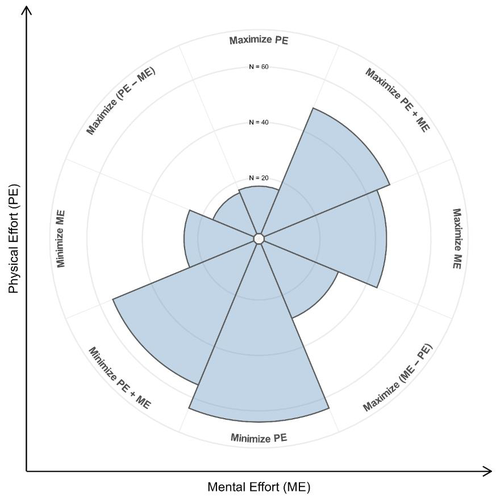
STEELE James
- Research Department, Steele Research Ltd, Southampton, United Kingdom
- Biomechanics, Exercise physiology, Exercise & Sports Psychology, Health & Disease, Meta-Science in Health & Movement, Physical Activity, Sports Performance
- recommender
Recommendations: 0
Review: 1
Review: 1

On the specifics of valuing effort: a developmental and a formalized perspective on preferences for mental and physical effort
Is effort evaluation domain-specific or general?
Recommended by Boris Cheval based on reviews by James Steele, Ines Pfeffer and 1 anonymous reviewerThe law of least effort suggests that, certis paribus, people tend to exert as little effort as possible when engaged in a goal-directed task (Cheval & Boisgontier, 2021). At the same time, however, large interindividual differences in the processing of effort have been observed, suggesting that effort per se can sometimes be valued positively (Inzlicht et al., 2018). However, until the present study by Wolff et al. (2024), all previous studies had largely ignored whether these individual differences in the valuation of effort might depend on the context (mental versus physical), i.e., in layman's terms, we do not know whether people value any effort or whether these preferences are specific to the mental and/or physical domain. The aim of the present study (Wolff et al., 2024) was to answer this question on the basis of two independent studies.
Study 1 (N = 39) used a binary decision task to measure preferences for allocating mental versus physical effort and showed that people differ markedly in their preferred allocation of effort. Crucially, a disposition to value mental effort (as assessed by the Need for Cognition Scale) was associated with a higher preference for mental effort, whereas a disposition to value physical effort (as assessed by the recently developed Value of Physical Effort Scale) was associated with a preference for physical effort.
Study 2 (N = 300 students) confirmed the robustness of the findings and showed that the tendency to value mental effort was associated with better grades in math (but showed no evidence of such an association in sport), whereas the tendency to value physical effort was associated with better grades in sport (but showed no evidence of such an association in math). Furthermore, the study extended these findings by showing that valuing physical effort was associated with less boredom in sports, whereas valuing mental effort was associated with less boredom in math.
In summary, the results of this research provide the first evidence suggesting that the valuation of effort is domain-specific rather than general. This finding paves the way for future research aimed at improving our understanding of the valuation of physical or mental effort. This article makes an important contribution to the knowledge of the key issues surrounding whether effort valuation is domain-specific or general.
Since all reviewers have indicated that they are satisfied with the authors' revision, which accurately and comprehensively addresses the reviewers' and my comments, it is my pleasure to recommend this preprint.
Cheval B, Boisgontier MP. The theory of effort minimization in physical activity. Exerc Sport Sci Rev. 2021;49(3):168-178. https://doi.org/10.1249/JES.0000000000000252
https://doi.org/10.31234/osf.io/ycvxw